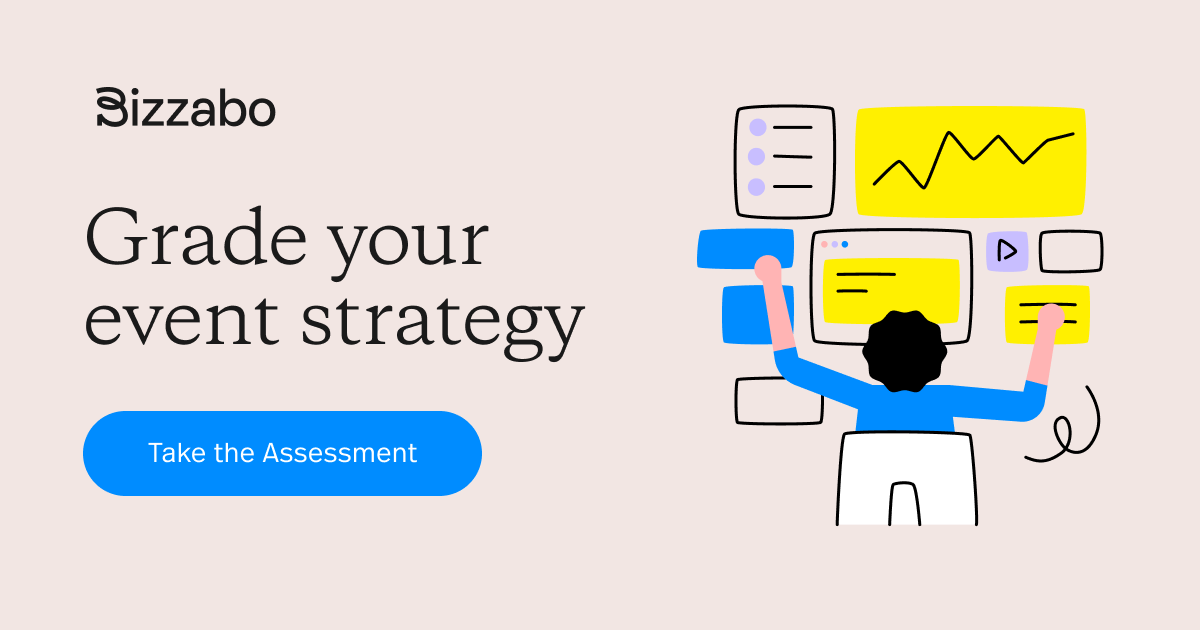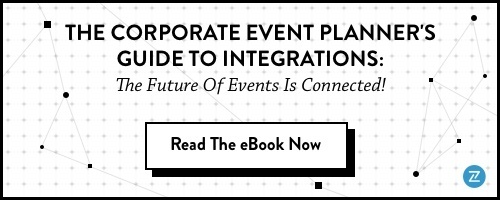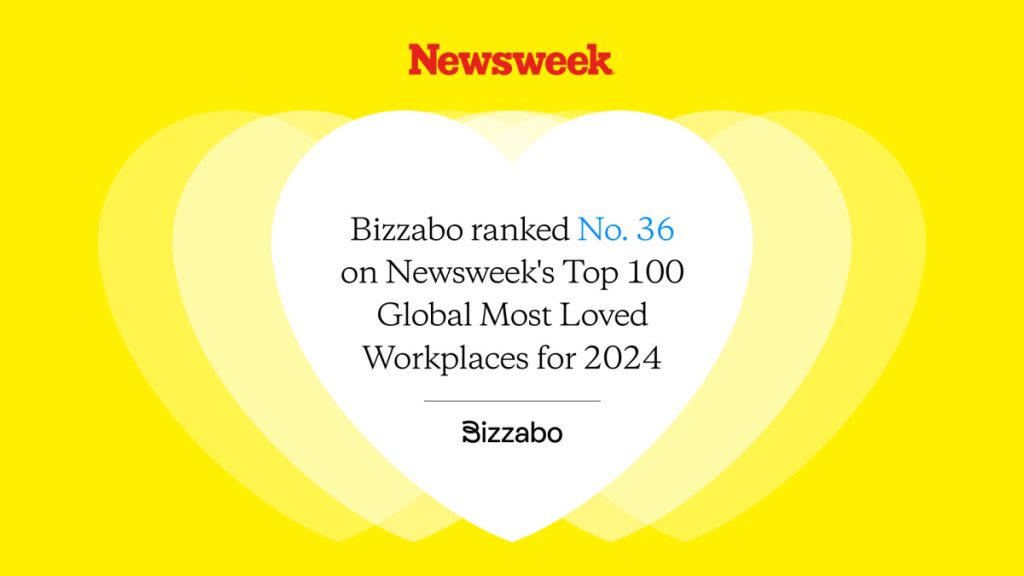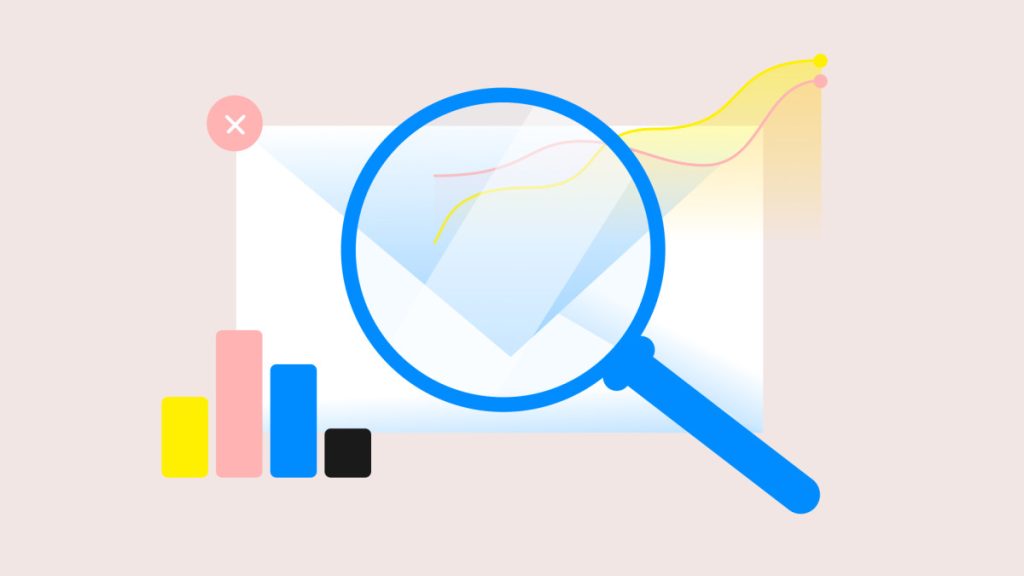15 Awesome Event Software Integrations for Event Marketers


You are in the middle of organizing the most incredible event the digital marketing community has ever seen. Your speakers are exceptional, the venue is ideal, and the event content is refreshingly original. Now all there’s left to do is to stay organized and execute…
*PING*
You get an email from your ticketing platform that someone just purchased a ticket. The first sale! You take their contact information and type it into an excel sheet. You then open Salesforce and re-enter the same contact info into the CRM database. After that, you re-enter (again!) the contact’s info to the HubSpot contact list that you use for marketing campaigns. Suddenly, a terrifying thought dawns on you. ‘I have to do this for every. Single. Person.’
An event planning system that lacks platform integrations can lead to a very messy and time-consuming event planning process. By having your platforms integrated with one another, you can achieve a much smoother and streamlined organizing process. Event technology has become extremely more advanced over the past few years—and integrations are a core reason for of these advancements. In fact, the top event software platforms all feature extensive integrations.
What Is An Event Software Integration?
Before diving into any examples, let’s break down the basics of event software integrations and how they benefit event organizers. In this context, event integrations refer to the synthesis of different automation platforms with a central event management software. For example, integrating a marketing automation platform (like HubSpot) with your event software would be considered an event integration. And when done properly, these integrations can yield high impact results as shown below.
- Streamlined Processes – Event software integrations create a much more efficient planning process by consolidating steps and optimizing workflows. This in turn saves the organizer precious time and energy which can then be devoted to other parts of the planning process such as securing sponsorships and finding speakers.
- Valuable Event Data – Event data is instrumental for drawing key insights which in turn help organizers make the right decisions to create a spectacular event. An integrated event marketing platform provides synthesized insights that would otherwise be impossible to access with a fragmented system.
- Actionable Insights – It’s one thing to collect data but a completely different endeavor when harnessing the data to reach actionable insights. Knowing how to utilize the data is crucial for event success and this can only be achieved through the right insights. This wouldn’t be possible without event integrations which requires an interconnected system.
Now let’s dive into some examples! Below you will find 15 awesome integrations that are ideal for specifically event marketers. Whether you’re in need of a more streamlined registration process or an efficient contact tracking system, the integrations below will help you find what you’re looking for. If you’re looking for the latest on-site event management integration, check out Bizzabo’s onsite solution.
 1. Slack
1. Slack
For those who are unaware (and kudos to those who are aware), Slack is one of the leading B2B messaging platforms in the industry. It is a real-time group chat that is built for effective internal communication and is ideal for groups that constantly need to be in sync. Slack works great for event organizers because it enables them to update other team members and receive updates about an event in real-time.
Once Slack is integrated with your event management software, not only can you ping your team members swiftly and efficiently, but you can also receive real time updates regarding your event. For example, you can set up triggers to receive a message every time someone purchases a ticket, joins the community, or visits the event website for the first time. This will save significant time and help you avoid annoying your team members with, “Hey, we got another one!” every few minutes. Leave that to Slack.
Like the sound of that? You can check out 30 awesome slack integrations here.
 2. Bizzabo’s Onsite Solutions
2. Bizzabo’s Onsite Solutions
Checking in attendees as they arrive at your event sounds like a simple enough task. However, one small mistake can easily snowball into complete chaos. Luckily, there are companies like Bizzabo’s Onsite Solutions to help avoid such catastrophes. Onsite Solutions is an event management tool that provides an array of awesome capabilities such as self check-ins, on-demand wristband printing, QR code scanning, and anything else you’ll need for an incredibly smooth on-site experience.
Any event organizer can easily see the benefits of integrating Bizzabo Onsite Solutions with their main event management software. This integration allows event organizers to have check-in information be automatically uploaded to their database, eliminating the need to manually update each check-in. An Onsite Solutions integration also means you’ll get to enjoy everything that Bizzabo has to offer, which is a first class on-site experience.
![]() 3. HubSpot
3. HubSpot
According to a Benchmark Reports by the Content Marketing Institute, professional events are one of the most popular B2B marketing tactics. With that in mind, it makes sense for event marketers to connect their event data with a marketing automation software to make sure all contacts and data from the event are being properly passed on to the marketing database. Hubspot is one of the leading marketing automation softwares in the world and they offer a full marketing suite that complements any live event initiative.
A Hubspot integration will allow you to avoid the hassle of manual data entry and allow registrant information to be directly updated to the Hubspot database. Once a contact is uploaded in Hubspot, you’re able to utilize the contact for future marketing campaigns that are done through Hubspot.
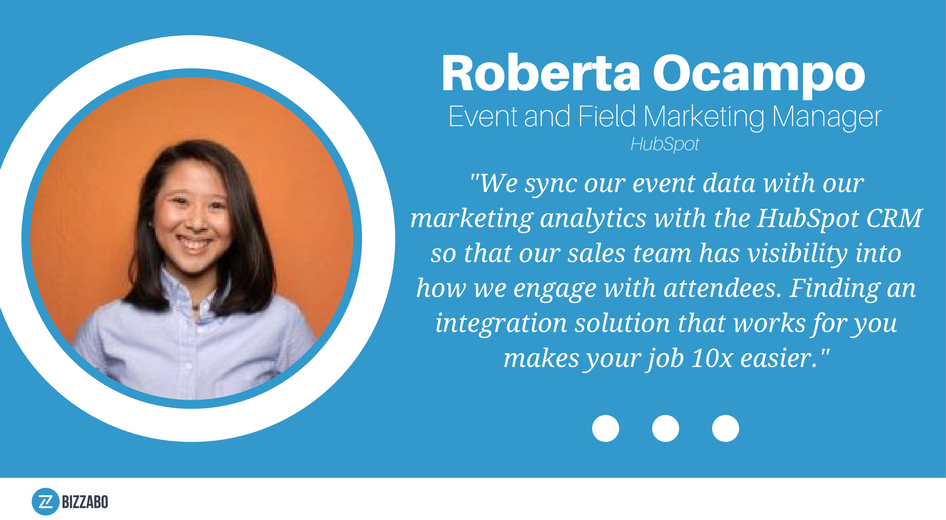
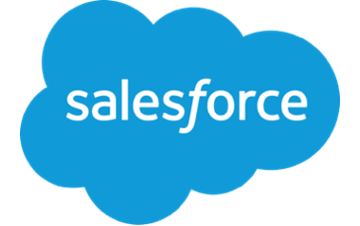 4. Salesforce
4. Salesforce
A Customer Relationship Management (CRM) platform is a powerful tool that allows you to manage business relationships and the data associated with them. CRM tools encompass much more than customer relationships and serve as a storehouse for valuable business and customer data that help to accurately measure ROI.
Salesforce is perhaps the most widely known CRM platform in the world. When integrated with an event management solution, Salesforce enhances the event organizer’s ability to understand attendee data and gain important insights. If your professional event is meant to generate new sales leads, a Salesforce integration will be incredibly useful. You can set specific criteria for qualified sales leads, label each event attendee accordingly, and have all of this data in a central location. In other words, a CRM integration will make your life a whole lot simpler.
 5. Mailchimp
5. Mailchimp
Email will most likely be the main form of communication between you and your attendees. Mailchimp is an email marketing platform that allows you to send automated email campaigns to a preset list of contacts.
By integrating MailChimp with your event management software, you can capture registration information from your event website send it directly to your MailChimp email lists. You can then send scheduled email campaigns to inform attendees of important updates, remind people to register for sessions or send push notifications in real time. There’s no need to manually enter each email address into MailChimp with this event integration. Easy!
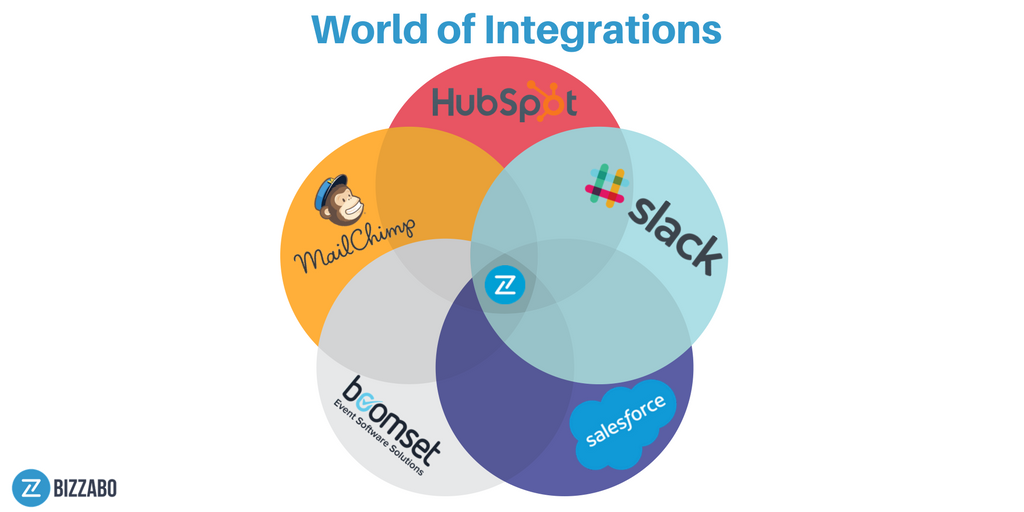
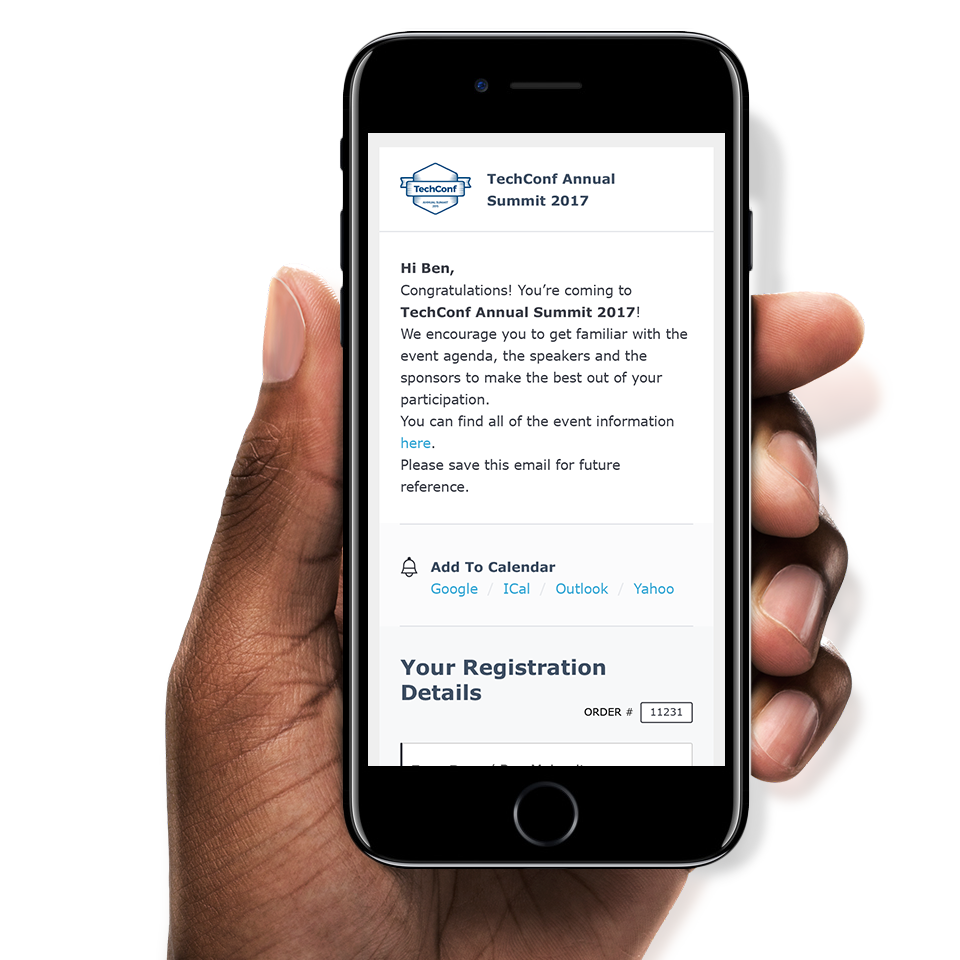 6. Mobile Event App
6. Mobile Event App
The event app is where attendees will find much of their opportunities for engagement. From scheduling their agendas, to connecting with other colleagues, to participating in polls and surveys, a world-class event app is necessary for an exceptional event experience. For an event app to perform to its full potential, it must be synced with the event management software.
By integrating the event app with the main software, organizers are able to do a number of awesome things. Event organizers can send push notifications in real time, invite attendees to fill out surveys, or update attendees about room changes. Having an integrated event app is a true game-changer and gives the event organizer full range to organize and execute on a great event.
![]() 7. Social Media
7. Social Media
Garnering significant social media buzz is a prerequisite for all successful events. Just ask the 12 social media experts. With the multiple social channels that are available in today’s digital space, it is difficult to manage every single social media platform. Thus, a social media dashboard serves well to keep all important data and analytics in a centralized location.
Integrating all social media channels with your event management platform will help you better understand the direct impact of different social media campaigns. This will give you the insight needed to optimize accordingly. As a bonus, you’ll be able to see all of your likes, shares, and retweets in one place. Now who wouldn’t want that?
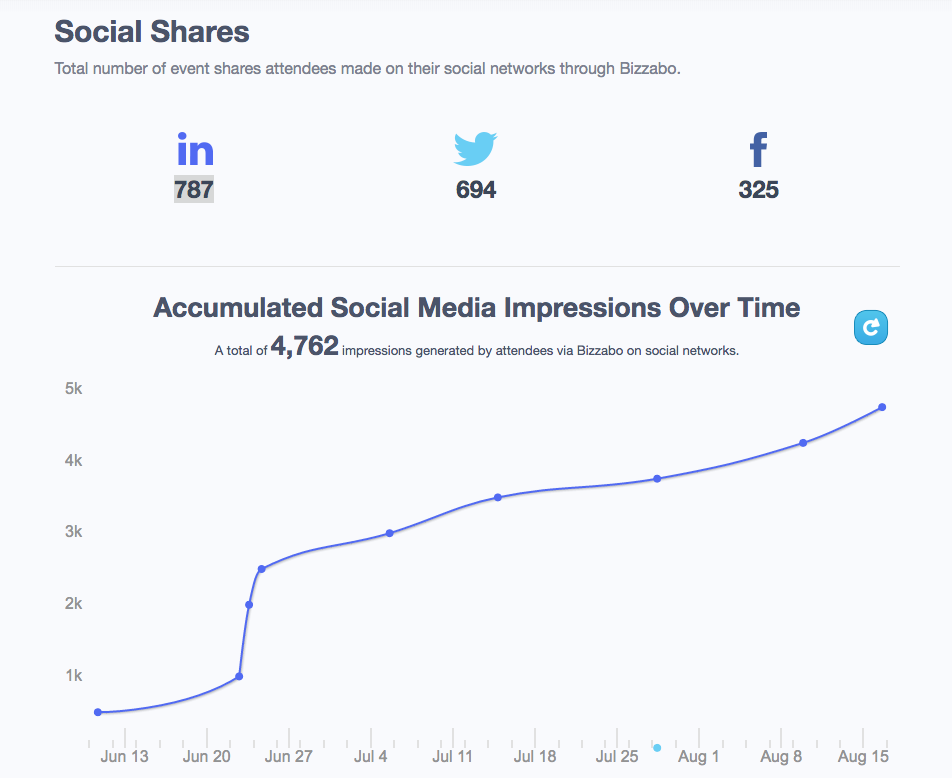
 8. GoToWebinar
8. GoToWebinar
In the case that you choose to have your event online, you will most likely use a platform on which you can easily host a webinar, such as GoToWebinar. However, manually entering each attendee to the webinar list is a time consuming process that is prone to human error. Once an integration is set between GoToWebinar and the event management platform, each registration can automatically be uploaded to the webinar attendee list. This event software integration makes for a much more streamlined process and smoother online event experience.
![]() 9. Payment Gateway
9. Payment Gateway
As a website visitor and potential event attendee, there’s something slightly inconvenient about being redirected to another site when purchasing an event ticket. The abrupt break in user flow makes for a poor user experience and may even give reason for potential attendees to doubt the credibility of the event. To avoid such situations, payment integrations are the way to go.
By embedding a payment gateway right onto your event website, attendees can enjoy a much more streamlined experience. This gives your website and event overall a much stronger feel of professionalism and reliability. These are key characteristics to impressing and engaging your attendees.
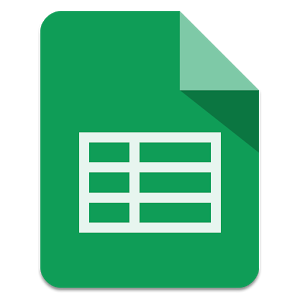 10. Google Sheets
10. Google Sheets
A superb event management software will be able to pull and store all sorts of important data. However, there always has to be a place for the data to be poured out and sorted through. This is where Google Sheets integration will come in handy. Google Sheets is a powerful tool not only because of its computative abilities but also because of its cloud-based sharing capabilities. By integrating with Google Sheets, you can see all registration information be automatically populated onto a sheet, where you can then pivot and analyze to your exact desires. Just make sure you’re measuring the right KPIs for event success.
![]() 11. Xero
11. Xero
Xero is an online accounting software that’s perfect for small businesses. It enables account holders to constantly monitor their cash-flow from anywhere with an internet connection. It’s collaborative, user-friendly and secure. A significant number of event marketers and organizers use Xero to maintain their event cash-flow.
Some event platforms are able to integrate with cloud-based accounting software like Xero, saving them the hassle of manually reconciling data between their event platform and their accounting platform. One use of integrating with Xero is that you can automatically issure a sales invoice whenever a purchase is made.
![]() 12. Zapier
12. Zapier
An integration with Zapier is like discovering the great Northwest Passage of the internet. It opens up a world of possibilities for event marketers. Zapier is not a marketing tool or a sales tool or an accounting tool. It’s all of the above. Over 750+ platforms integrate with Zapier. By linking your event platform to Zapier, you make it possible to integrate with platforms that you might not otherwise be able to integrate with. There are other ways of accomplishing this end (see Webhooks and Open API below), but none is as easy and smooth as Zapier.
The secret to Zapier’s simplicity are its triggers and actions. Simply set a trigger within an integrated app (for instance, when someone places an event registration order) and then choose the resulting action (their contact details are automatically added to your marketing platform).
![]() 13. IFTTT
13. IFTTT
IFTTT stands for “If This Then That.” In case you’re wondering, it’s pronounced like “lift” minus the “l.” IFTTT is one of the easiest tools to learn in this list, but don’t let that simplicity fool you. This free web-based service is capable of creating complex chains of automated actions. IFTTT is comprised of two simple features. The triggers are “if this” and the resulting actions are “then that.” These two features make up applets, the core of this automation tool. As of today, IFTTT can connect to over 360 application
One applicaiton of IFTTT is to keep track of all of the tweets to your event handle. First, create an “if this” statement for “Anytime someone creates a tweet with my event handle.” Next create a “then that” statement for “Save this tweet to a Google Sheet.” Once her event is over, you will have an easy to access list of attendees who engaged with your event on Twitter.
![]() 14. Webhooks
14. Webhooks
Webhooks are used to send data from one web application to another after an action is completed. By sending real time data from one system to another, your processes will be automated. You can use webhooks to send data notifications, changes, and any other real time updates. By specifying a URL for receiving the information you are able to trigger a transfer of data you have stored in your event app to any desired application. Similarly to Zapier, Webhooks are comprised of two different types of components. Whenever a trigger occurs (such as a charge being captured or a ticket email changed) data is sent to a specific endpoint (a URL defined by the user to receive events).
Say you want every registrant to get a username and a password for the server system that is hosting your upcoming webinar. You could write code for a specific URL on your server system and then enter that coded URL into the Webhooks interface. Now, whenever anyone registers via your event platform, their data is automatically sent to the coded URL where it is rephrased and synced with his online system. Magic.
![]() 15. Open API
15. Open API
Open APIs offer a robust way for event organizers to sync data from their event platform with additional systems. However, this requires extensive knowledge in coding and an event platform with an API that is public. If you find that other integration options are too limited or too expensive it may be worth using an open API to create custom integration solutions.
One application of an open API is to link your event platform with an on-site system to print badges and check in attendees. Using some advanced coding skills, you can seamlessly sync the event registrant data hosted on the event platform with your on-site system.
Wrapping Up: Event Integrations for You
Integrations allow event organizers to save time, decrease errors, increase productivity, and improve event ROI. If you are not fully convinced of the impact of integrations, let’s dive deeper! Click on the button below to read our integrations eBook and learn which types of data are worth integrating and the specific ways you can go about doing so.
